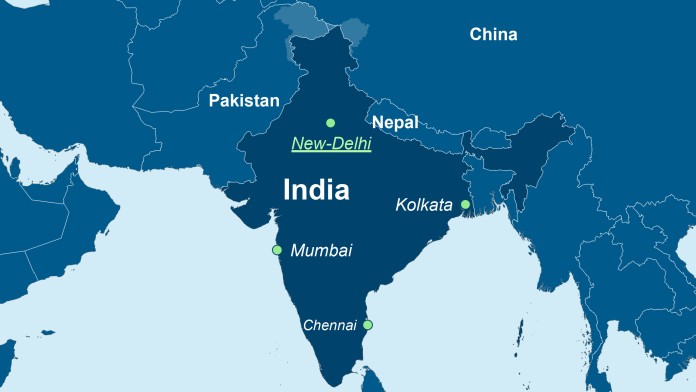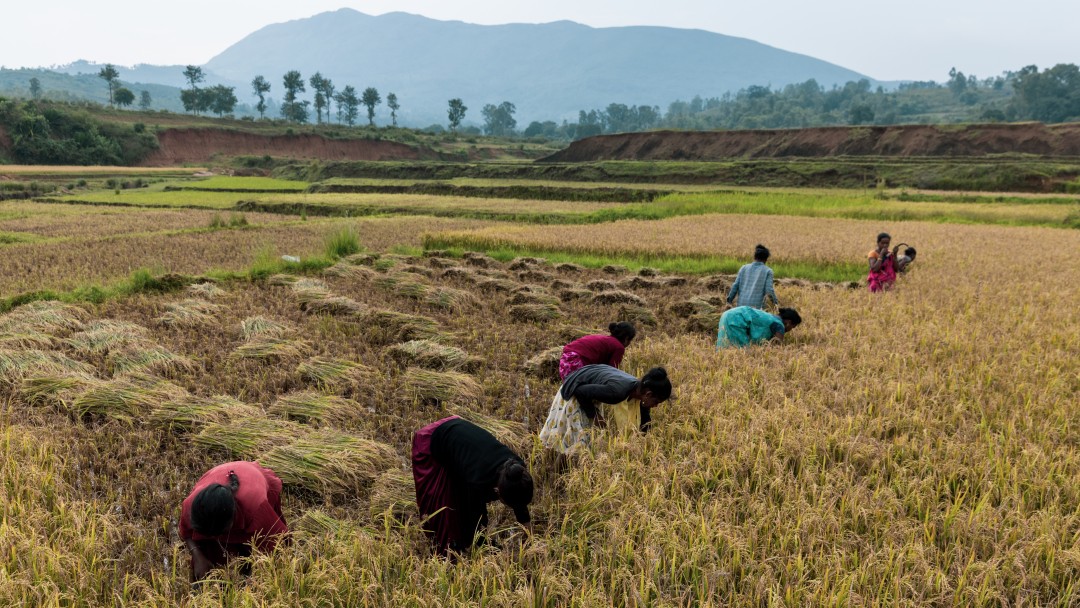
As of: 03/2024
India is a country of contrasts. High-rise buildings, cutting-edge technology and a thriving IT industry characterise many cities, while small villages dominate the countryside. Much of the often poor rural population lives on subsistence farming. The farms are very small and an increasing amount of arable land has been degraded. As a result of climate change, droughts and flooding are more frequent, which reduces yields. Commissioned by the German Federal Government, KfW has launched a new, innovative project, issuing a loan of more than EUR 90 million to promote climate resilience and more sustainable agriculture on smallholdings in the state of Andhra Pradesh. This will not reimburse the costs of the programmes – the money will only be paid out when results are achieved.
India’s population continues to grow in rural areas as well. But it is becoming increasingly difficult to generate sufficient income through agriculture: more than half of the arable land is being affected by degradation. The soil life is being destroyed with humus disappearing from the earth. This is also due to the improper use of mineral fertilisers and synthetic pesticides. Divisions of inherited property and huge population growth also mean that farms are becoming smaller and smaller, making it difficult to live off yields produced.
The state government has committed itself to improving the situation of smallholdings and protecting natural resources more. Since 2016, it has promoted the expansion of Community Managed Natural Farming, an approach based on regenerative farming principles. This approach largely avoids the use of synthetic pesticides and fertilisers. The method, known in India as "natural agriculture", focuses on the restoration of soil life, landscape renewal, diversification and species-rich production. The project-executing agency is the state Farmer Empowerment Organisation, Rythu Sadhikara Samstha (RySS). RySS mainly works with women’s self-help groups in the villages.

The government’s goal is that all six million farms in Andhra Pradesh will switch to this climate-resilient, natural agricultural method within the next ten years. But for this to be possible, funds are required. On behalf of the Federal Ministry for Economic Cooperation and Development (BMZ), KfW is providing a loan of EUR 90 million and a grant of EUR 1 million to promote the climate resilience of smallholder farms in Andhra Pradesh. These funds are intended to help convince around 500,000 micro-businesses to start using this production technique by 2027. As part of the results-based approach, the money will only be paid out after the agreed outcomes have been achieved. Loan amounts will be disbursed in instalments as soon as the defined targets are achieved.
The project aims to help stabilise and increase the long-term agricultural incomes of the predominantly extremely poor farming families in Andhra Pradesh. It will also help increase resilience to climate change on two levels: on the one hand, it will strengthen the economic situation of farmers and, on the other hand, improve the soil's fertility and water retention capacity.
KfW is also supporting the Indian-German Global Academy for Research and Teaching in Agricultural Ecology (IGGAARL) in the agroecology area. The academy is researching the successes of natural agriculture in Andhra Pradesh and producing scientific studies to international standards. The results are intended to contribute to improving rural living conditions (particularly in terms of security of food supply, income and health) and improving the soil. Farmers are involved in the research and teach the new methods. IGGAARL studies are intended to help provide evidence for the effectiveness of agroecological methods. The aim is to increase acceptance of agricultural practices that are in harmony with nature, which will lead to more families opting for innovative, sustainable farming and raising their standard of living. The selection and cultivation of resistant crop species helps to stabilise yield rates and minimise crop losses. This also helps in the adaptation to climate change.
Based on agroecological approaches developed in India, the programme in Andhra Pradesh is tailored to the local conditions and will undergo continuous further development. The efforts are focused on natural farming through close involvement and cooperation with smallholders. Farmers use natural resources such as cow dung, mulch, cow urine and plant extracts to improve soil quality and as fertiliser. This is a more horticultural-based and more manual production technique.
The agroecological production technique is set to revitalise the soil and strengthen plants’ disease resistance. Since this technique allows plants' roots to grow faster than when the plants are grown using conventional cultivation methods, the plants are better protected against cyclones and droughts. They can tap into nutrients more easily as the humus layer is built up and soil life is activated. A wide range of microorganisms such as earthworms, bacteria, fungi, algae and single-cell organisms increase soil fertility. A large number of consultants who live in the villages and use the new production techniques themselves ensure that the knowledge is passed on.
Given that female farmers perform a large share of agricultural work, they are a mainstay of the project. In addition, they help to promote the approach and spread it more widely in the villages. Many women are organised in self-help groups that work for social change and improved health, which means they are very well connected and this allows them to share their experiences. These groups have become important promoters of the approach in Andhra Pradesh.
Meanwhile, the approach is increasingly attracting attention in other Indian states, too. The degree of success in each case is to be evaluated by accompanying research, which will regularly examine the effects on income and the environment. This will then be critically scrutinised by the Indian central government with regard to security of food supply at national level.
The Academy of Agroecology Research and Learning in Andhra Pradesh is also reviewing the approach and refining the natural farming methods. So far, there has been little funding for research in natural and organic farming in comparison with conventional farming, which has led to a significant need in terms of knowledge of production technology and yields, contributing to the mitigation of climate change and ecosystems, as well as economic output and alleviating poverty
The project contributes to the achievement of these following United Nations Sustainable Development Goals:
KfW Group
KfW Development Bank
KfW India Office
Share page
To share the content of this page with your network, click on one of the icons below.
Note on data protection: When you share content, your personal data is transferred to the selected network.
Data protection
Alternatively, you can also copy the short link: https://www.kfw-entwicklungsbank.de/s/enzBy5_t
Copy link Link copied